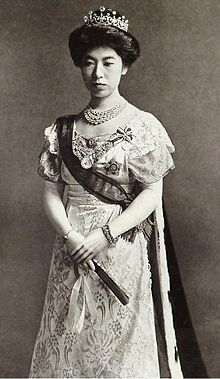Empress Teimei
| Empress Teimei 貞明皇后 |
|||||
|---|---|---|---|---|---|

Formal portrait, 1912
|
|||||
| Empress consort of Japan | |||||
| Tenure | 30 July 1912 – 25 December 1926 |
||||
| Enthronement | 10 November 1915 | ||||
| Born |
25 June 1884 Nishikichō, Tokyo Prefecture, Japan |
||||
| Died | 17 May 1951 (aged 66) Ōmiya Palace, Minato, Tokyo, Japan |
||||
| Burial | 22 June 1951 Musashi Imperial Graveyard, Hachiōji, Tokyo, Japan |
||||
| Spouse | Yoshihito, Emperor Taishō | ||||
| Issue |
Hirohito, Emperor Shōwa Yasuhito, Prince Chichibu Nobuhito, Prince Takamatsu Takahito, Prince Mikasa |
||||
|
|||||
| House | Imperial House of Japan | ||||
| Father | Michitaka Kujō | ||||
| Mother | Ikuko Noma (concubine) | ||||
| Religion |
Shinto Buddhism (Lotus Sutra) |
||||
| Full name | |
|---|---|
| Sadako (節子?) |
|
Styles of Empress Teimei |
|
|---|---|
 |
|
| Reference style | Her Majesty |
| Spoken style | Your Majesty |
| Alternative style | Ma'am |
Empress Teimei (貞明皇后 Teimei-kōgō?, 25 June 1884 – 17 May 1951) was the wife of Emperor Taishō of Japan. Born Sadako Kujō (九条節子 Kujō Sadako?), she was the mother of Emperor Shōwa. Her posthumous name, Teimei, means "enlightened constancy".
Sadako Kujō was born on 25 June 1884 in Tokyo, as the fourth daughter of Duke Michitaka Kujō, head of Kujō branch of the Fujiwara clan. Her mother was Ikuko Noma.
She married then-Crown Prince Yoshihito (the future Emperor Taishō) on 25 May 1900. The couple lived in the newly constructed Akasaka Palace in Tokyo, outside of the main Tokyo Imperial Palace complex. When she gave birth to a son, Prince Hirohito (the future Emperor Shōwa) in 1901, she was the first official wife of a Crown Prince or Emperor to have given birth to the official heir to the throne since 1750.
She became Empress (Kōgō) when her husband ascended to the throne on 30 July 1912. Given her husband's weak physical and mental condition, she exerted a strong influence on imperial life, and was an active patron of Japanese Red Cross Society. The relations between the Emperor and Empress were very good, as evidenced by Emperor Taishō’s lack of interest in taking concubines, thus breaking with hundreds of years of imperial tradition, and by her giving birth to four sons.
...
Wikipedia
